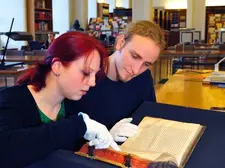Programme Profil




In the bachelor’s degree programme in Medieval Studies, you have the opportunity to learn about the European Middle Ages from many different perspectives. The Middle Ages was a period lasting around 1000 years that experienced numerous political, social and ideological changes and shaped the world as we know it today. Study medieval documents, languages and artefacts. Learn how to look at this period from different perspectives, to conduct research with a focus on various subject areas, and in so doing, gain insights into a variety of disciplines within the humanities.
Key to understanding – thematic clusters
Self-selected focus areas are an essential component of your studies. From each thematic cluster, you can select one discipline that you wish to study as a subdiscipline of Medieval Studies. This creates a basis covering a range of disciplines within the humanities that will also enable you to explore modern issues from various perspectives and approach them with different methods.
Thematic cluster I: Linguistic structures and literary representations
English Studies; German Language, Literature and Culture; Iranian Studies; Greek and Latin Studies; Romance Studies; Slavic Studies
You’ll be dealing with literature and medieval languages in this cluster. How did the Old English Beowulf or the Middle High German Nibelungenlied sound? How has language changed over the centuries? What media existed, such as hand-written codices or early forms of printing, and what did media changes mean for society?
Thematic cluster II: Historical sources and theoretical texts
Medieval History, Auxiliary Sciences of History, Philosophy, Catholic Theology
Discover how to approach medieval sources and learn how to understand them. What were the political and social contexts? What expectations did people have in this other time? And how did they react to political or social changes?
Thematic cluster III: Material culture and visual representations
Medieval and Post-Medieval Archaeology, Heritage Conservation Studies, Islamic Art and Archaeology, Art History
As well as exploring expressions of thought in the Middle Ages, you’ll also address material culture in this thematic cluster. Which tools did people have available to them? How can we research houses or castles that have long since disappeared from the surface? How did existing artefacts serve as expressions of culture? And how can we preserve what still exists for future generations?
Read more about the participating disciplines.
Practice-oriented studies with close links to current research
In addition to your focus areas, you will attend seminars created specifically for this programme that illuminate a topic from different angles and subject-specific perspectives and help hone your interdisciplinary thinking skills. You’ll get a first-hand view of medieval artefacts, medieval research and professions in the field of cultural studies, and you will also learn about how the Middle Ages are taught. Visit lectures from specialists in current research and present your final thesis to the experienced members of the Centre for Medieval Studies (ZEMAS). At the same time, gain complementary skills such as foreign language proficiency, IT knowledge or methodological approaches from other disciplines in the humanities.
Programme objectives
- The competent methodological and content-related evaluation and classification of medieval texts, artefacts and findings
- The interdisciplinary application of academic approaches and the creation of new points of view by combining different perspectives
- The competent presentation and communication of the findings of interdisciplinary medieval research for a broad audience
Type of studies
The bachelor’s degree programme in Medieval Studies can be studied full-time or part-time. You may enrol in a degree programme part-time without justifying your decision. You may also switch from a full-time model to a part-time model during any semester’s enrolment period. Please find further information on studying part-time on the university’s central pages.